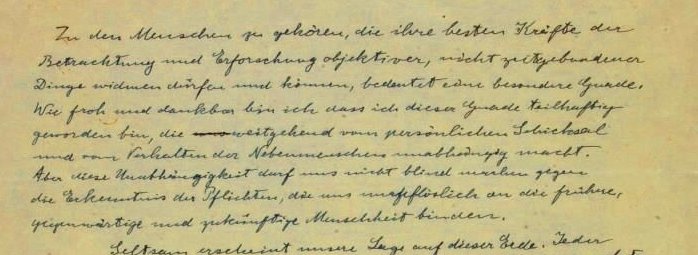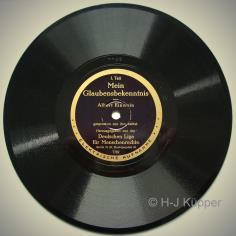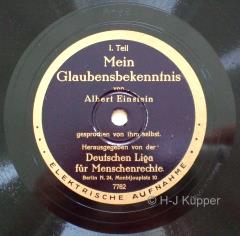“The most beautiful and deepest experience a man can have is the sense of the mysterious.”
Albert Einstein, “My Credo”, 1932
EINSTEIN’S CREDO
At the end of August 1932 Einstein wrote “My Credo” in Caputh and read it for a recording by order and to benefit of the German League of Human Rights probably at the end of September/ beginning of October. The handwritten original manuscript was handed over to Konrad Wachsmann, the architect of his summer house in Caputh.

Albert Einstein Archiv – Call Nr 28-218.00
The text of Einstein‘s credo tells us something about his ideological and political attitude during his last years in Berlin. The spoken word compared to the written word lets you feel the high emotional value and the depth of information of the recording – despite all the technical inadequacies and its shortness. In this recording the great physicist and humanist shows his craving for truth, humanity and peace in an impressive way.
The exact date of the recording is not known today. As Einstein had left Germany in the beginning of December 1932 to hold guest lectures in the U.S., but did not return, the recording must date earlier. Today it is assumed that it was recorded by the end of September/beginning of October 1932. The record was released around the turn of the year 1932/1933, presumably with only a low number of copies and a limited distribution. It is also unknown whether an open sale, no sale at all or a sale just during a short period took place. Today this sound document from Einstein has scarcity value indeed.
Correspondence from this time, which could supply more detailed information, is not known. However, it is possible that the corresponding agreements between the German League of Human Rights and Einstein were made by phone or directly. Thus the journalist und publisher Kurt Grossmann (1897-1972), who was born in Berlin, worked as secretary of the German League of Human Rights in Berlin, starting in 1926.


Data of the record:
| Text / author: | Albert Einstein, Berlin / Caputh |
| Speaker: | Albert Einstein, Berlin / Caputh |
| Title: | Mein Glaubensbekenntnis (My Credo) |
| Runtime: | 3′ 58” (3 minutes, 58 seconds), part I 1′ 59”, part II 1′ 59” |
| On behalf of: | German League of Human Rights Berlin N. 24, Monbijouplatz 10 |
| Recording date: | End of September/beginning of October 1932 |
| Release date: | Turn of the year 1932/1933 |
| Record company: | Probably Clausophon, Berlin or Orchestrola |
| Label codes: | 7782, 7783 |
| Number of copies: | low, exact number of copies unknown |
| Material of the records: | Shellac |
| Dimensions: | Diameter: 20 cm, Thickness: 2.5 mm, Centre hole: 7mm |
| Speed: | 78 min-1 |
| Cover: | Paper, blank |
| Number of copies still available today (2022): | Very few (maybe some 10 copies worldwide!) |
Sound document: Albert Einstein – Mein Glaubensbekenntnis (My Credo), 1932, (in German)
Courtesy of the Albert Einstein-Archives, Hebrew University of Jerusalem, Israel
Original text in German:
Mein Glaubensbekenntnis
[I. Teil]
“Zu den Menschen zu gehören, die ihre besten Kräfte der Betrachtung und Erforschung objektiver, nicht zeitgebundener Dinge widmen dürfen und können, bedeutet eine besondere Gnade. Wie froh und dankbar bin ich, dass ich dieser Gnade teilhaftig geworden bin, die weitgehend vom persönlichen Schicksal und vom Verhalten der Nebenmenschen unabhängig macht. Aber diese Unabhängigkeit darf uns nicht blind machen gegen die Erkenntnis der Pflichten, die uns unaufhörlich an die frühere, gegenwärtige und zukünftige Menschheit binden.
Seltsam erscheint unsere Lage auf dieser Erde. Jeder von uns erscheint da unfreiwillig und ungebeten zu kurzem Aufenthalt, ohne zu wissen, warum und wozu. Im täglichen Leben fühlen wir nur, dass der Mensch um anderer willen da ist, solcher, die wir lieben, und zahlreicher anderer, ihm Schicksalsverbundener Wesen.
Oft bedrückt mich der Gedanke, in welchem Maße mein Leben auf der Arbeit meiner Mitmenschen aufgebaut ist, und ich weiß, wie viel ich Ihnen schulde.
Ich glaube nicht an die Freiheit des Willens. Schopenhauers Wort: ‘Der Mensch kann wohl tun, was er will, aber er kann nicht wollen, was er will’, begleitet mich in allen Lebenslagen und versöhnt mich mit den Handlungen der Menschen, auch wenn sie mir recht schmerzlich sind. Diese Erkenntnis von der Unfreiheit des Willens schützt mich davor, mich selbst und die Mitmenschen als handelnde und urteilende Individuen allzu ernst zu nehmen und den guten Humor zu verlieren.
Nach Wohlleben und Luxus strebte ich nie und habe sogar ein gut Teil Verachtung dafür. Meine Leidenschaft für soziale Gerechtigkeit hat mich oft in Konflikt mit den Menschen gebracht, ebenso meine Abneigung gegen jede Bindung und Abhängigkeit, die mir nicht absolut notwendig erschien.
[II. Teil]
Ich achte stets das Individuum und hege eine unüberwindliche Abneigung gegen Gewalt und gegen Vereinsmeierei. Aus allen diesen Motiven bin ich leidenschaftlicher Pazifist und Antimilitarist, lehne jeden Nationalismus ab, auch wenn er sich nur als Patriotismus gebärdet.
Aus Stellung und Besitz entspringende Vorrechte sind mir immer ungerecht und verderblich erschienen, ebenso ein übertriebener Personenkultus. Ich bekenne mich zum Ideal der Demokratie, trotzdem mir die Nachteile demokratischer Staatsform wohlbekannt sind. Sozialer Ausgleich und wirtschaftlicher Schutz des Individuums erschienen mir stets als wichtige Ziele der staatlichen Gemeinschaft.
Ich bin zwar im täglichen Leben ein typischer Einspänner, aber das Bewusstsein, der unsichtbaren Gemeinschaft derjenigen anzugehören, die nach Wahrheit, Schönheit und Gerechtigkeit streben, hat das Gefühl der Vereinsamung nicht aufkommen lassen.
Das Schönste und Tiefste, was der Mensch erleben kann, ist das Gefühl des Geheimnisvollen. Es liegt der Religion sowie allem tieferen Streben in Kunst und Wissenschaft zugrunde. Wer dies nicht erlebt hat, erscheint mir, wenn nicht wie ein Toter, so doch wie ein Blinder. Zu empfinden, dass hinter dem Erlebbaren ein für unseren Geist Unerreichbares verborgen sei, dessen Schönheit und Erhabenheit uns nur mittelbar und in schwachem Widerschein erreicht, das ist Religiosität. In diesem Sinne bin ich religiös. Es ist mir genug, diese Geheimnisse staunend zu ahnen und zu versuchen, von der erhabenen Struktur des Seienden in Demut ein mattes Abbild geistig zu erfassen.”
Translation:
My Credo
[Part I]
“It is a special blessing to belong among those who can and may devote their best energies to the contemplation and exploration of objective and timeless things. How happy and grateful I am for having been granted this blessing, which bestows upon one a large measure of independence from one’s personal fate and from the attitude of one’s contemporaries. Yet this independence must not inure us to the awareness of the duties that constantly bind us to the past, present and future of humankind at large.
Our situation on this earth seems strange. Every one of us appears here, involuntarily and uninvited, for a short stay, without knowing the why and the wherefore. In our daily lives we feel only that man is here for the sake of others, for those whom we love and for many other beings whose fate is connected with our own.
I am often troubled by the thought that my life is based to such a large extent on the work of my fellow human beings, and I am aware of my great indebtedness to them.
I do not believe in free will. Schopenhauer’s words: ‘Man can do what he wants, but he cannot will what he wills,’ accompany me in all situations throughout my life and reconcile me with the actions of others, even if they are rather painful to me. This awareness of the lack of free will keeps me from taking myself and my fellow men too seriously as acting and deciding individuals, and from losing my temper.
I have never coveted affluence and luxury and even despise them a good deal. My passion for social justice has often brought me into conflict with people, as has my aversion to any obligation and dependence I did not regard as absolutely necessary.
[Part 2]
I have a high regard for the individual and an insuperable distaste for violence and fanaticism. All these motives have made me a passionate pacifist and antimilitarist. I am against any chauvinism, even in the guise of mere patriotism.
Privileges based on position and property have always seemed to me unjust and pernicious, as does any exaggerated personality cult. I am an adherent of the ideal of democracy, although I know well the weaknesses of the democratic form of government. Social equality and economic protection of the individual have always seemed to me the important communal aims of the state.
Although I am a typical loner in daily life, my consciousness of belonging to the invisible community of those who strive for truth, beauty, and justice keeps me from feeling isolated.
The most beautiful and deepest experience a man can have is the sense of the mysterious. It is the underlying principle of religion as well as of all serious endeavour in art and science. He who never had this experience seems to me, if not dead, then at least blind. To sense that behind anything that can be experienced there is a something that our minds cannot grasp, whose beauty and sublimity reaches us only indirectly: this is religiousness. In this sense I am religious. To me it suffices to wonder at these secrets and to attempt humbly to grasp with my mind a mere image of the lofty structure of all there is.”

Courtesy of the Albert Einstein Archives, Hebrew University of Jerusalem, Israel.
Picture credits:
Courtesy of the Albert Einstein-Archives, Hebrew University of Jerusalem, Israel, Call Nr 28-218.00: 1
Archive of the author: 2, 3
Bibliography:
| Siegfried Grundmann | Einsteins Akte | Berlin, 2004 |
| Michael Grüning | Ein Haus für Albert Einstein | Berlin, 1990 |
| Friedrich Herneck | Albert Einsteins gesprochenes Glaubensbekenntnis | Naturwissenschaften, 1966 |
| Friedrich Herneck | Einstein und sein Weltbild | Berlin, 1976 |
| Kenji Sugimoto | Albert Einstein. A photographic biography | 1989 |


 DEUTSCH
DEUTSCH